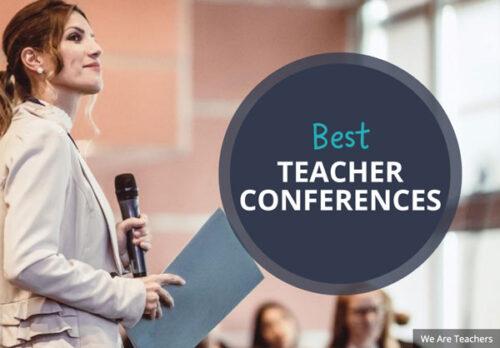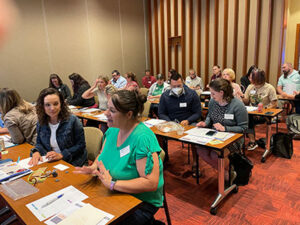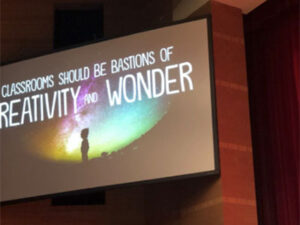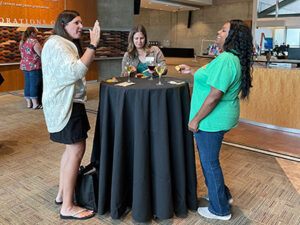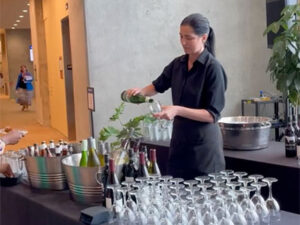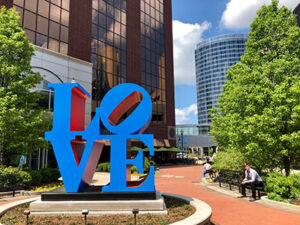Science on the Grand 2024
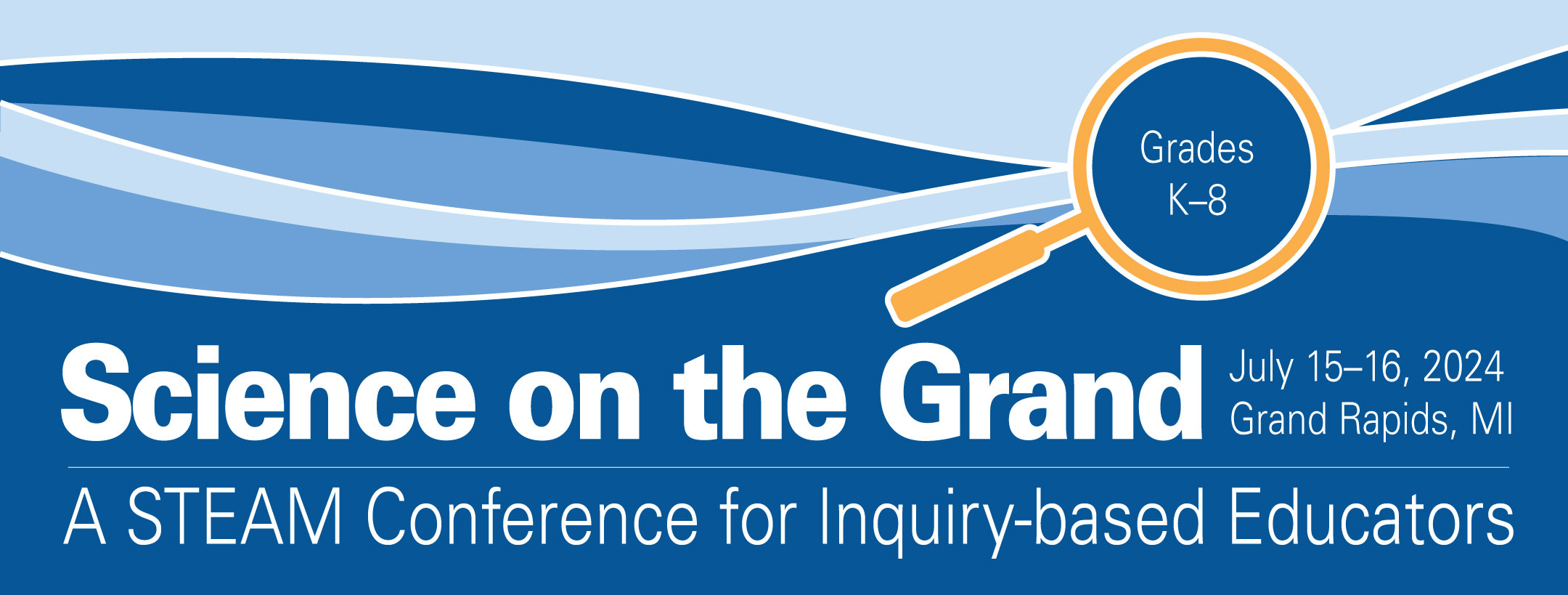
Get ready for a GRAND conference this July!
Ignite your passion for teaching like never before! Science on the Grand isn’t just an event; it’s a celebration of you – the superheroes of education! We understand that teaching isn’t just a job, it’s a calling. That’s why we’ve crafted one amazing STEAM conference, filled with practical, teacher-tested ideas that will fuel your teaching fire. Experience NGSS-aligned sessions focused on cutting-edge, inquiry-driven, and classroom-ready strategies. Science on the Grand 2024 will help you take your teaching to the next level!
This conference will give you the VIP treatment you deserve. You’ll have the chance to mix, mingle, and marvel with fellow educators who share your passion for science and teaching. Plus, with catered meals, free drinks, and fabulous prizes, you’ll be given the time and space you need to relax and focus on becoming even more awesome than you already are!
Join us for this GRAND experience, where you will:
- Gather fresh insights: Acquire new ideas and perspectives to rejuvenate your teaching approach — and build a classroom where curiosity, creativity, and critical thinking thrive!
- Reinvigorate your passion for teaching: Find inspiration and motivation through engaging sessions and networking with fellow educators.
- Advance your skill set: Elevate your teaching with strategies and techniques tailored for today’s educational challenges.
- Nurture personal and professional connections: Build lasting relationships with educators and experts, enriching your support network and collaborative opportunities.
- Discover innovative resources: Uncover a plethora of tools and resources to enhance your classroom experience and student engagement.
You’ve dedicated your life to shaping futures, and now it’s our turn to shape an unforgettable experience for you. This is THE educational conference of the year, and you will not want to miss it! Register now for Science on the Grand 2024!
$50 off registration thanks to the support of generous donors!++
Plus, a limited number of scholarships are available thanks to the generous sponsorship of Susan Meell. If interested, please inquire at [email protected].
Registration includes:
- Two days of inspiration, exploration, and practical take aways
- Opportunities to network with like-minded teachers
- Free parking in the Grand Rapids Community College Parking Ramp B, within walking distance from Van Andel Institute
- Breakfast, lunch, VIP treatment, and more!
Individual Tuition:
- Early Bird: $100 per person until May 15, 2024.
- $150 per person from May 15-June 15, 2024 thanks to generous donors.
- $200 per person from June 15 -July 15, 2024 (the conference is valued at $800 per person).
All prices per person. Registrations cannot be shared.
+With the paid registration of a staff member, an administrator from the same building/district may attend for FREE. Free administrator registrations are nontransferable. To receive the free administrator offer, administrators must register by phone with name of paid registrant. Call 616.234.5528.
++Science on the Grand is valued at $800 but is subsidized by the Van Andel Institute and our generous donors, making it an affordable experience for educators!
Convince Your Administrator:
Need help convincing your administrator? Use this sample Administrator Request Letter that highlights all the great reasons you should attend Science on the Grand.
When & Where:
Monday, July 15 – Tuesday, July 16, 2024
7:00 AM–3:30 PM
Van Andel Institute Campus
333 Bostwick Ave. NE
Grand Rapids, MI 49503
616.234.5528
Parking in the GRCC Parking Ramp B will be validated.
Where to Stay:
Hyatt Place Grand Rapids/Downtown (0.4 miles)
Special rate: $174 per night if reserved by June 14th
Make an online Reservation or call 1-800-233-1234 (reference Van Andel Institute room block)
Additional Nearby Hotels:
Homewood Suites by Hilton Grand Rapids Downtown (0.4 miles)
City Flats Hotel (0.5 miles)
Amway Grand Plaza (0.6 miles)
JW Marriott (0.6 miles)
Residence Inn by Marriott Grand Rapids Downtown (0.6 miles)
Hampton Inn & Suites Grand Rapids Downtown (0.7 miles)
5 reasons why you should attend Science on the Grand!
1. You will learn SOOOO MUCH.
Spark your curiosity with 32+ sessions dedicated to research-based and classroom-tested STEAM content strategies at every grade level. You’ll walk away with practical ideas you can share with your students this fall. There’s even opportunities to tour Van Andel Institute, take a STEAM walk in downtown Grand Rapids, or unwind with a therapeutic art activity.
2. Two days, two inspiring keynotes.
At Science on the Grand, you’ll start each day with our engaging keynotes who will explore what it means to spark curiosity in your classroom, and how to inspire students to be future problem solvers.
3. Network with like-minded educators.
You’ll become part of a community of educators who value STEAM education and authentic learning. The support, idea-sharing, and camaraderie you’ll find is sure to re-energize you and infuse new inspiration into your work.
4. Stay fueled all day long.
We’ll feed you a substantive breakfast, lunch, beverages, and snacks on both days so you’ll be well-fueled throughout the conference. On Monday afternoon, we’ll treat you to a cocktail reception with Van Andel Institute’s exclusive catering company.
5. Experience Grand Rapids, Michigan.
The conference is located in the heart of downtown Grand Rapids’ medical mile, within walking distance of the Grand Rapids Art Museum, Grand Rapids Public Museum, Gerald R. Ford Presidential Museum, Van Andel Arena, and a vast array of unique restaurants. Frederick Meijer Gardens and John Ball Zoo are also nearby.
Two days, two great keynotes!
Monday, July 15, 2024:
Trevor Muir
Teacher, Author, Speaker
Making Learning Epic: Using Purpose to Inspire
Purpose is a powerful motivator, for educators and their students. Using inspirational stories and researched-based strategies, Trevor shares how to use the power of story, brain science, and authentic learning to help teachers achieve true student engagement. Educators leave with proven practices to design authentic learning experiences, motivation to foster deeper student connections, and a compelling reminder of the impact they have on their students’ lives.
About Trevor Muir
Trevor Muir is a passionate educator, speaker, and author who believes in the transformative power of education. He has gained international recognition for his innovative teaching methods and inspiring content, which empower teachers and students to unleash their full potential.
For more information on Trevor Muir, go to trevormuir.com
Tuesday, July 16, 2024:
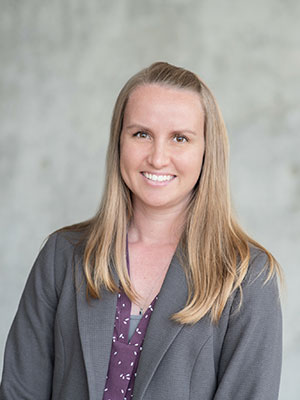
Scientist, Assistant Professor
EmPOWERing Tomorrow’s Scientists: Studying the Cell’s Powerhouse to Drive Metabolic Therapies
We all learned it in high school science class: “Mitochondria are the powerhouse of the cell.” But what does that mean? And why did we have to memorize it? VAI’s Dr. Sara Nowinski studies how mitochondria provide our bodies with the energy necessary for life, and how mitochondrial function goes awry in disease. Dr. Nowinski will also explain how early classroom experiences sparked her passion for research, and outline her “wishlist” learning objectives for K-12 science students.
About Sara Nowinski, Ph.D.
Dr. Sara Nowinski is an expert in mitochondrial biology and metabolism. She earned her Ph.D. in pharmaceutical sciences from the University of Texas at Austin, where she investigated the role of mitochondrial respiration and cancer metabolism. In 2014, she accepted a postdoctoral fellowship in the lab of Dr. Jared P. Rutter at University of Utah School of Medicine. While there, she developed and led a project that explored mitochondrial fatty acid synthesis (mtFAS) and metabolism. Her research revealed groundbreaking new insights into the significance of the mtFAS system, and reignited interest in studying this critical pathway. In 2021, she joined Van Andel Institute’s Department of Metabolism and Nutritional Programming as an assistant professor.
For more information on Dr. Sara Nowinski, go to the Nowinski Laboratory.
Two days — 30+ practical sessions!
Introducing our 2024 session line-up that will inspire you to create classrooms where curiosity, creativity, and critical thinking thrive. Our sessions are designed to give you practical takeaways you can use in your classroom right away!
Grades K-5
5 Ways to Make Room for Science in an ELA and Math World
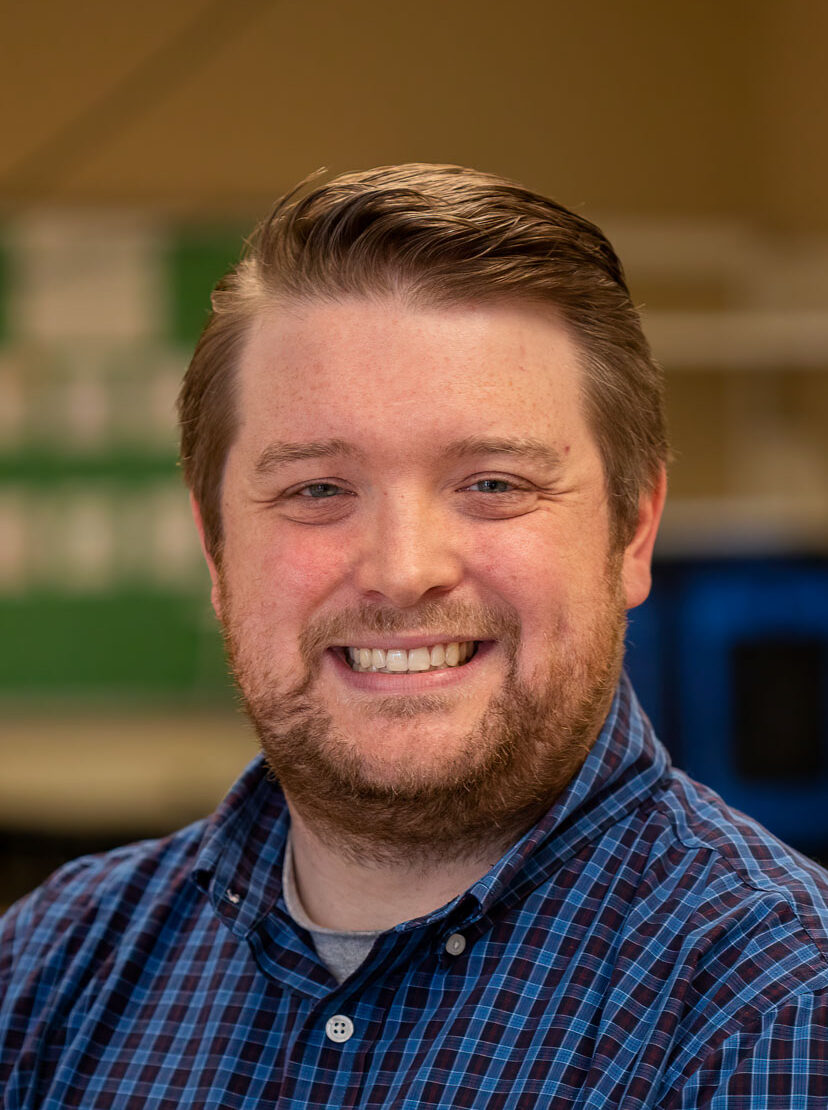
With all the attention focused on math and ELA, science can sometimes get the short stick. But it doesn’t have to be that way! Come to this fast-paced session to learn 5 practical ways that you can incorporate science into your classroom tomorrow and have your students begging for more!
AI-gniting Curiosity for STEAM in Your Classroom
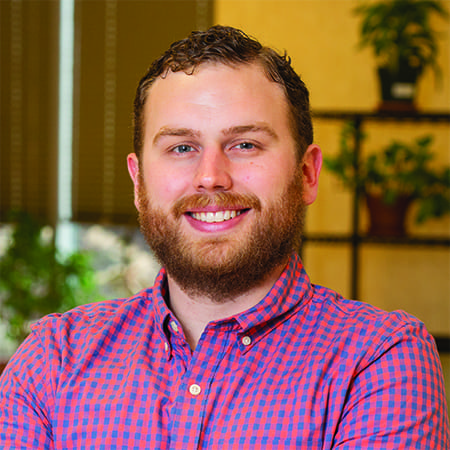
AI empowers educators to create future-focused STEAM environments that prepare students for an evolving technological landscape. In this session, explore 5 ways to utilize AI in STEAM and unleash creativity, innovation, and problem solving. Leave with practical ideas you can use tomorrow. Let’s spark the future of STEAM together!
Books to Builds: STEM Activities to Complement Your Favorite Read-Alouds
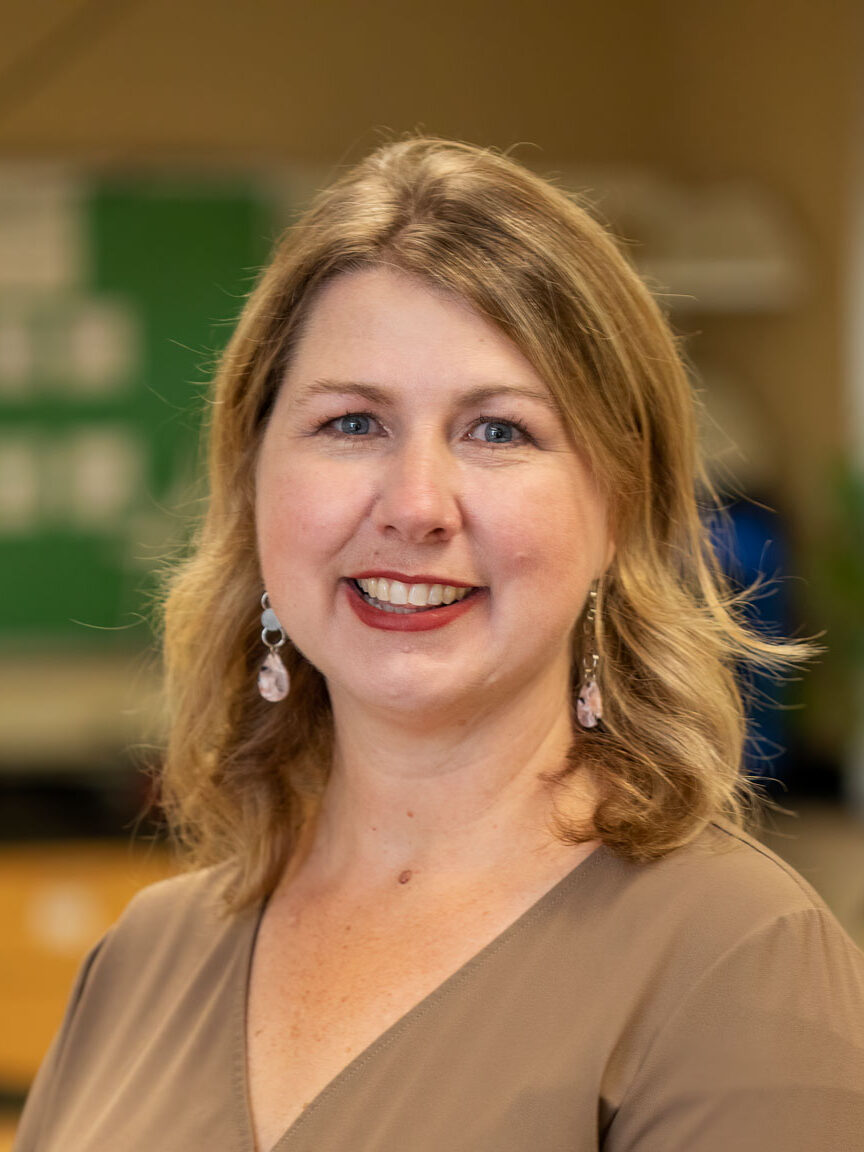
Discover innovative STEM activities tailored to popular read-alouds. Participants will experience five engineering challenges inspired by beloved books. This hands-on workshop empowers educators to confidently integrate STEM into their existing curriculum, enriching students’ learning experiences. Leave equipped to inspire young minds with the magic of reading and the excitement of engineering.
Challenge Based Learning: Student Projects with Real World Impact
Why spend weeks on a project that ultimately finds its way to the Paper Gator when you could be spending time on a project that impacts a real-world need? Develop strategies for hands-on learning projects that create solutions for local, national, and even global needs. From a better understanding of the design process, to social media marketing, challenge-based learning provides practical tools for solving actual problems.
From Classroom Crafts to STEM Challenges: A Deeper Look at Standards and Pacing
Dive into the world of STEM with an interactive session that transforms classroom crafts into engaging STEM challenges. Examine standards and pacing to deepen understanding and enhance curriculum design. Through hands-on activities, learn to seamlessly integrate STEM principles, fostering a rich learning environment that encourages creativity, problem-solving, and critical thinking.
Go Wild with Outdoor Environmental Games
From “Oh Deer” to “Ultimate Hide and Seek”, engage in fun activities designed to not only simulate habitat and animal behaviors, but also come equipped with proven pedagogy to make the learning stick.
Immersive Field Experience: Learn Science by Doing Science

Be the teacher that transforms everyday lesson plans into authentic, memorable learning experiences! In this hands-on workshop, dive into an investigation utilizing the Van Andel Institute’s Instructional Model for Inquiry-Based Science, which integrates a process of inquiry, a rich learning environment, and habits of mind. Discover four small, but powerful changes you can make right away to boost student engagement and kick-start science inquiry in your classroom. Come with a mindset ready to inspire and leave with a toolkit of practical strategies to make it happen! Science Investigation: Crime Scene Forensics
Immersive Field Experience: Teaching Students to Think and Act Like Engineers

In this immersive workshop, learn how to inspire your K-5 students to tackle hands-on challenges within thoughtfully applied constraints. Engage directly in an engineering lesson crafted around Van Andel Institute’s instructional model for engineering design. Walk away with powerful strategies to foster an environment of risk-taking and perseverance, ensuring your students not only face challenges with confidence but also embrace the iterative process of design and problem-solving. Join us for this transformative experience and become a catalyst for the budding engineers in your classroom! Engineering Challenge: Lights Out!
Modeling Using Student Talk Moves: The Key to Classroom Discourse
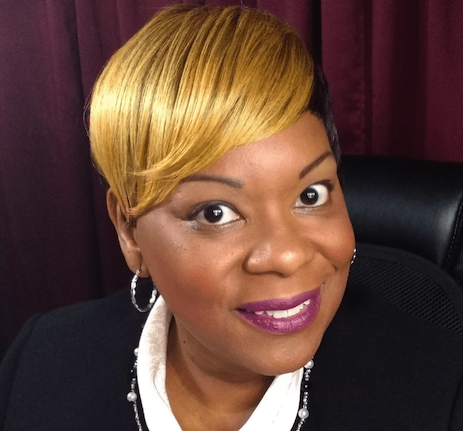
Unlock the power of student talk moves in this interactive session designed to enhance classroom discourse. Learn effective strategies to encourage meaningful conversations and critical thinking among your students. Through hands-on activities, discover how to facilitate rich dialogue and build a vibrant learning community. Transform your classroom into a hub of dynamic and thoughtful communication.
Orchestrating Success: Effective Strategies for Managing Your STEM Classroom
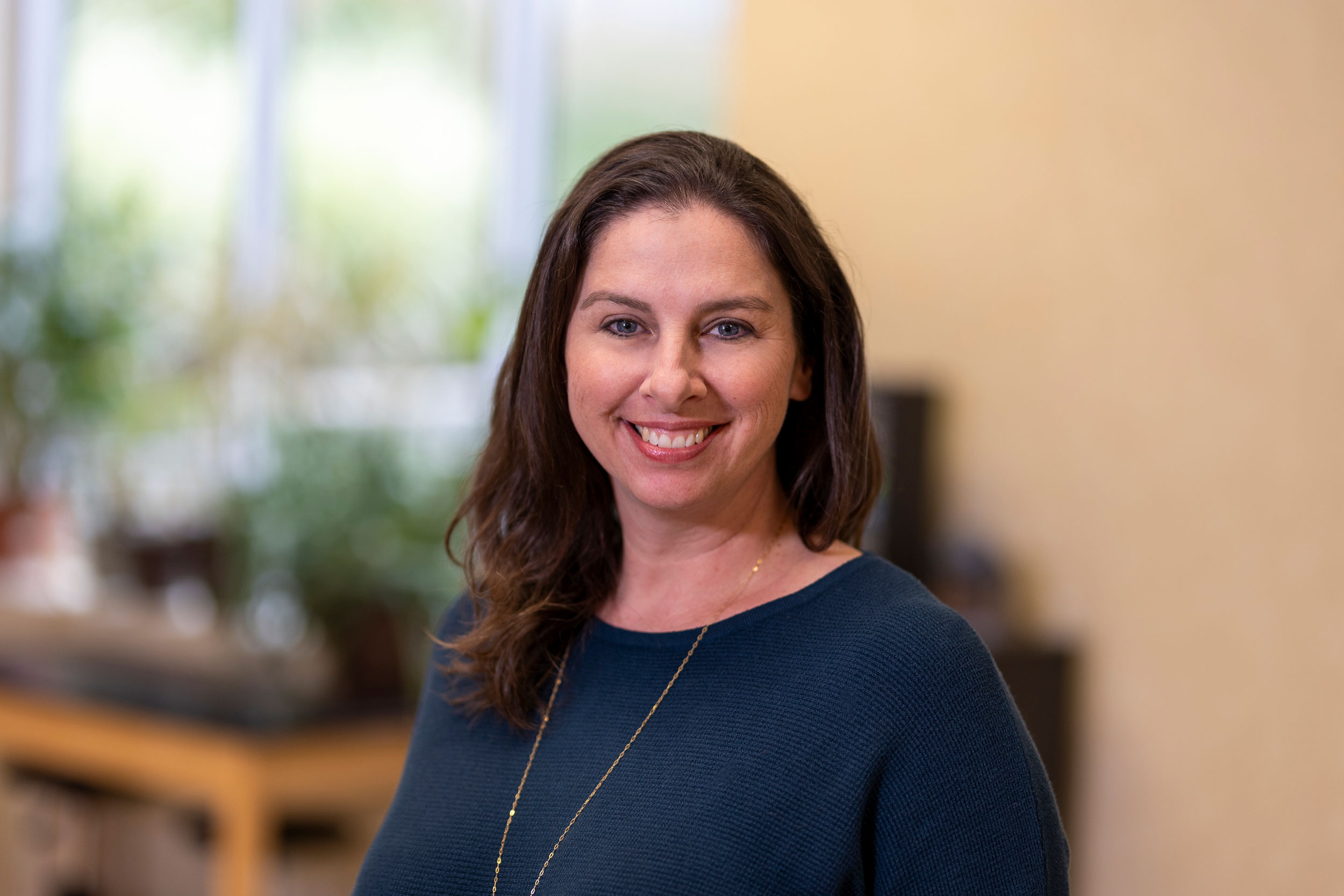
Step into the world of STEM education excellence with our comprehensive professional development workshop designed to equip teachers with the skills and strategies needed to manage dynamic STEM classrooms effectively. Whether you’re a seasoned STEM educator or just starting to integrate STEM into your teaching, this workshop will provide valuable insights, practical tools, and collaborative opportunities to enhance your classroom management skills.
Grades 6-8
Empowering Educators for Inclusive Discussions

Confidently integrate controversial science topics into your curriculum, fostering critical thinking, and informed citizenship. Participants will explore best practices for creating inclusive learning environments and facilitating respectful discussions on contentious scientific issues.
Immersive Field Experience: Learn Science by Doing Science

Be the teacher that transforms everyday lesson plans into authentic, memorable learning experiences! In this hands-on workshop, dive into an investigation utilizing the Van Andel Institute’s Instructional Model for Inquiry-Based Science, which integrates a process of inquiry, a rich learning environment, and habits of mind. Discover four small, but powerful changes you can make right away to boost student engagement and kick-start science inquiry in your classroom. Come with a mindset ready to inspire and leave with a toolkit of practical strategies to make it happen! Science Investigation: Using Model Organisms — Daphnia Investigation.
Immersive Field Experience: Teaching Students to Think and Act Like Engineers

In this immersive workshop, learn how to inspire your 6-8 students to tackle hands-on challenges within thoughtfully applied constraints. Engage directly with an engineering lesson crafted around Van Andel Institute’s instructional model for engineering design. Walk away with powerful strategies to foster an environment of risk-taking and perseverance, ensuring your students not only face challenges with confidence but also embrace the iterative process of design and problem-solving. Join us for this transformative experience and become a catalyst for the budding engineers in your classroom! Engineering Challenge: Maglev Race-off!
Making it Matter! Relevance and Authenticity in Math and Science
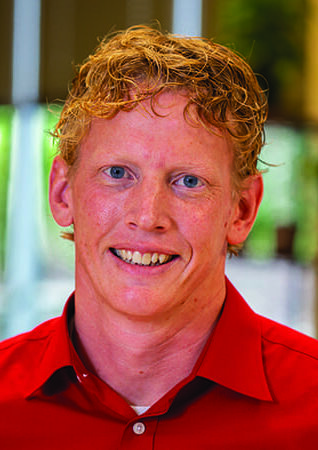
When are we ever going to use this? It’s an important question–but one that we struggle to answer in many traditional classrooms. In this memorable and meaningful session, you’ll discover simple ways to help students behold the awesome powers of math and science to make a difference in their world — today!
Nurturing Future Leaders: Integrating Soft Skills through Curiosity, Creativity, and Critical Thinking

As educators, we understand that academic success is only one piece of the puzzle. Join us for a transformative professional development workshop that focuses on harnessing the power of curiosity, creativity, and critical thinking to cultivate essential soft skills in your students. This workshop is designed to equip teachers with practical strategies and innovative approaches to integrate these skills seamlessly into their classrooms.
Seeing Science through a Multi-Cultural Lens

Explore science with a multicultural perspective in this interactive session. Engage in hands-on activities that highlight diverse scientific contributions and worldviews. Discover teaching strategies that integrate cultural awareness, fostering inclusivity and curiosity in your science curriculum. See science education through a new lens, embracing diversity to enrich learning experiences.
The Power of PBL in Middle School Classrooms
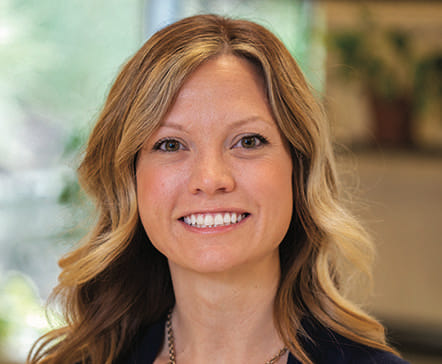

Middle School is a critical age. Too often, it’s when students disengage and decide that school isn’t for them. Project-Based Learning (PBL) can be an impactful antidote to this challenge. Explore the power of PBL to reach every student and help them pursue a deeper and more meaningful educational journey.
Using AI for Authentic Learning


When we think of Artificial Intelligence, we sometimes think of sterile interactions in a drab computer lab. But what if AI could help your students get engaged, take risks, and have a powerful impact on their communities and the world? In this session, you’ll discover how to leverage the power of AI to make learning memorable, meaningful, and FUN!
Using Inquiry to Drive Instruction

Inquiry is at the heart of good teaching and learning. In this session, participants will explore the Van Andel Institute for Education’s model of Inquiry-Based science instruction, and discover the four changes they can make right away to kick-start inquiry in middle-school classrooms. Walk away with ready-to-use inquiry-based strategies and lesson ideas to begin transforming your classrooms!
Utilizing Outdoor Phenomenon For STEM Education
Discover how nature’s wonders can enhance STEM learning! This hands-on session demonstrates how teachers can use the curiosity sparked by outdoor phenomena to teach scientific principles, foster critical thinking, and connect students more deeply with the world around them. Leave with a practical plan for how YOU can activate engaged learning in real-world contexts.
Grades K-8
Classrooms that Matter: Bring Science to Life with PBL

Teachers want to create memorable, meaningful learning experiences that give an authentic context for learning, but who has the time?! Discover how to save yourself time while implementing project-based learning with cross-curricular content, collaboration opportunities, and authentic real-world connections. Explore specific units that engage students in making the world a better place—without skimping on academic rigor!
Designing Meaningful Learning Experiences through Relevance and Student Interest
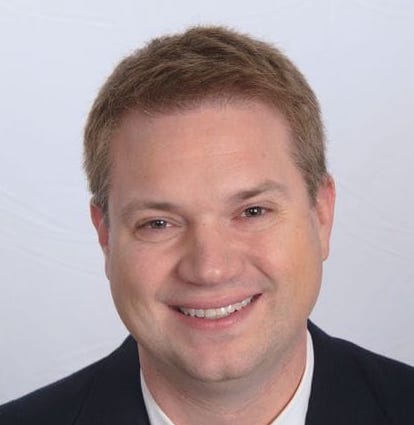
Explore how to create relatable and engaging learning experiences that bring relevance and deeper meaning to the elementary or middle school science classroom. Delve into the transformative power of Project-Based Learning (PBL), providing students with active, hands-on, and minds-on experiences that bridge scientific concepts with real-world applications and authentic purposes. Through this workshop, empower your students to become curious about the world and develop the assertiveness to actively engage with it. Foster curiosity and strengthen students’ connection to your content by creating captivating learning experiences that tap into students’ interests and the world around them. When science is this invigorating, students can’t help but become curious about their world and develop the assertiveness to actively make a difference in it!
Empowering Students: Self-Directed Learning and Collaboration

Join the author of the book “Optimized Learning” as he shares ideas and strategies to cultivate self-directed, collaborative learners who excel independently. Learn strategies to empower students with purpose, resilience, and effective time management. Discover how to foster confidence, capability, and collaboration, guiding students to navigate their educational journey with clarity and drive. Transform your classroom into a hub of self-directed excellence, equipped with practical tools and insights for success!
Harnessing AI to Increase Curiosity, Creativity, and Critical Thinking in Our Students

Unleash the potential of AI in this interactive session to spark curiosity, creativity, and critical thinking in students. Discover how AI tools can transform learning experiences, offering innovative ways to challenge and engage your learners. Through practical and easy to implement strategies, learn to integrate AI seamlessly into your teaching practice, fostering a future-ready environment that nurtures these essential skills.
Purposeful Technology to Create Authentic Learning Experiences
Authentic learning leads to deeper learning. When used with intentionality, technology can help enhance authenticity and give tangible purpose to student work. This session is about how certain technologies can be used to enhance authenticity in the classroom, assist students in meaningful work, and teach them skills they will need the rest of their lives.
STEM on a Shoestring

Discover innovative, budget-friendly strategies to weave rich STEM learning into elementary and middle-school classrooms. Empower students with essential skills, regardless of financial constraints.
Student Motivation: How to Reach EVERY Kid

Discover a simple, powerful frame for understanding what motivates the unique students in your classroom. Then, learn practical strategies you can use right away that will help you connect with your kids and get them fired up to learn!
We Can Do Hard Things: Kickstarting Perseverance in Your Classroom

As students walk through your doors, each day brings its own set of challenges and opportunities. Some students arrive eager and ready to tackle new learning experiences, while others may seem less enthusiastic. Join us as we explore practical strategies for creating a classroom culture rooted in perseverance. You’ll gain valuable insights for boosting student motivation and fostering a growth mindset in this dynamic learning environment.
Curiosity Sessions
Mindful Scribbles

Unwind with “Mindful Scribbles,” an artistic session designed for relaxation and creativity. Delve into meditative doodling to craft your own abstract masterpiece, guided step-by-step in a stress-free environment. No talent required—just let your imagination lead. End the session with a personal piece of art as your own reminder to carry the tranquility back to your classroom and beyond.
STEAM Walk-about Tour


Bring your walking shoes to discover evidence of STEAM all around you with a downtown stroll of Grand Rapids. We’ll take you on an insider’s tour of downtown Grand Rapids’ hot spots including La Grande Vitesse, the grand river, and Rosa Park Circle.
Van Andel Institute for Research Tour
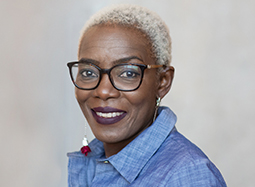

Ever wonder what a scientist does throughout their day? Are you interested in sharing those experiences with your students? Discover the ins and outs of life for a biomedical research scientist as you explore the inner workings of Van Andel Institute for Research, a research facility committed to determining the epigenetic, genetic, molecular, and cellular origins of cancer, Parkinson’s, and other diseases and translating those findings into effective therapies.
Meet these experts and innovators in STEAM education!
Introducing our Science on the Grand 2024 presenter line-up:
Michael Grieb serves as a Learning Specialist at VAI Education. With experience in field research from various disciplines, Michael seeks to share authentic STEM content with students and educators. Michael also has a great fascination with thinking about the future of learning. Michael loves to explore new technologies and their potential applications to the classroom and brings a unique perspective to inspire teachers to experiment with technologies.
Kim Harding has 19 years of experience working with students in the disaster relief sector, as well as 11 years of experience teaching grades 2-5. During her time as an educator, Kim was a building science lead and STEM coordinator for her school. Kim is thrilled to be working with VAI Education as a Learning Specialist to support educators in delivering inquiry-based lessons that nurture students’ curiosity, creativity, and critical thinking.
Cory Kavanagh’s passion for education and helping others learn is obvious in his role as Learning Specialist at VAI Education. Cory has worked in laboratory settings for over 13 years, lending his knowledge and skill to a variety of scientific organizations. As a key member of the Student Programs team, Cory strives to deliver engaging STEM content for students of all ages.
Andy Losik has been teaching for 24 years in a variety of school settings. For the last two decades, he has specialized in technology at the elementary level in Hamilton, Michigan. In 2016 Andy co-founded a new STEM program that will serve learners in the district’s four elementary schools.
Jamie MacPherson has 13 years of experience teaching kindergarten and fourth grade. During her time as an educator, Jamie worked closely with VAI Education as her school transformed their science program to better meet the needs of 21st century learners. Inspired by the way inquiry-based instruction positivly impacted her students, Jamie was eager join VAI Education as a Learning Specialist and become a part of their mission to foster curiosity, creativity, and critical thinking in classrooms everywhere.
Dawn McCotter has spent over 20 years in education, most of which were dedicated to teaching high school science. She is a passionate educator who believes that creating meaningful and authentic learning experiences is key to unlocking student engagement and success. As Curriculum and Instruction Senior Manager at VAI Education, Dawn supports a team of educators in the delivery of engaging inquiry-based student programs and relevant professional development opportunities and support for teachers across the country.
Trevor Muir is a passionate educator, speaker, and author who believes in the transformative power of education. He has gained international recognition for his innovative teaching methods and inspiring content, which empower teachers and students to unleash their full potential.
Cassie Mullen has spent nearly a decade teaching STEM in a variety of classroom settings. During her time as an educator, Cassie took on the role of a K-5 STEAM Specialist and was part of opening a new STEM school to help integrate daily science into all classrooms. Cassie is thrilled to be working with VAI Education as a Curriculum Developer to promote innovation in education through technology and inquiry-based learning.
Dr. Sara Nowinski is an expert in mitochondrial biology and metabolism. She earned her Ph.D. in pharmaceutical sciences from the University of Texas at Austin, where she investigated the role of mitochondrial respiration and cancer metabolism. In 2014, she accepted a postdoctoral fellowship in the lab of Dr. Jared P. Rutter at University of Utah School of Medicine. While there, she developed and led a project that explored mitochondrial fatty acid synthesis (mtFAS) and metabolism. Her research revealed groundbreaking new insights into the significance of the mtFAS system, and reignited interest in studying this critical pathway. In 2021, she joined Van Andel Institute’s Department of Metabolism and Nutritional Programming as an assistant professor.
Jon Oosterman spent six years teaching middle school science while also serving as the head coach of Science Olympiad. In addition to teaching, he helped his school transition to the Next Generation Science Standards (NGSS) as a way to create a broader and more comprehensive understanding of STEM. As a VAI Education Learning Specialist, Jon endeavors to create learning experiences that are fun, dynamic, and memorable for all students.
Randy Schregardus is a veteran educator with 34 years of experience teaching across multiple grade levels and subjects. An early adopter of inquiry-based education methods, Randy was instrumental in introducing science teaching reform where he assisted and trained teachers in the latest learning technologies. As an Instructional Operations Manager for VAI Education, Randy works to foster a culture of success both within and beyond the classroom.
Paul Solarz is a retired 4th & 5th grade teacher of 20+ years and author of “Learn Like a PIRATE: Empower your students to collaborate, lead and succeed”. His other accolades include Top 50 Global Teacher Prize Finalist (Varkey), Illinois Educator of the Year (ICE/IDEA), and Teacher of Excellence Award (Van Andel Institute for Education). Paul is also the co-author of the Blue Apple projects, “Take a Stand” and “State of Sustainability.”
Ben Talsma has spread a love of learning to students of all ages over the course of 15 fabulous years in education. In addition to teaching, he has built a STEAM program to cultivate a new generation of innovators, while also supporting a plethora of afterschool activities. Ben is thrilled to be working with VAI Education as a Learning Specialist to help teachers around the world improve the lives of their students.
Terra Tarango is an accomplished executive in the education industry with more than 20 years of experience in educational publishing and services. Prior to joining VAI Education, Terra served as president of SDE, one of the largest providers of professional development for pre-K through 12th grade educators in the U.S. Before that, she developed award-winning print and digital curriculum with Houghton Mifflin Harcourt, the largest educational publisher in the nation. She is an expert in instructional climate and culture and has devoted her career to increasing curiosity, creativity, and critical thinking in the classroom.
Jeanine is an educational expert who delivers high-energy keynote presentations that challenge educators to shift their focus and pay attention to what already works and how it can be transformed to meet the needs of today’s student. Audiences love her practical strategies that they can apply personally and professionally. Jeanine earned her MBA from Eastern Michigan University. She has received numerous awards as a professional educator.
Monday, July 15
7:00 - 8:00 AM: Free Breakfast
8:00 - 9:00 AM: Keynote
Making Learning Epic: Using Purpose to Inspire
Purpose is a powerful motivator, for educators and their students. Using inspirational stories and researched-based strategies, Trevor shares how to use the power of story, brain science, and authentic learning to help teachers achieve true student engagement. Educators leave with proven practices to design authentic learning experiences, motivation to foster deeper student connections, and a compelling reminder of the impact they have on their students’ lives.
9:15 - 10:15 AM: Sessions
From Classroom Crafts to STEM Challenges: A Deeper Look at Standards and Pacing
Grades K-5
Dive into the world of STEM with an interactive session that transforms classroom crafts into engaging STEM challenges. Examine standards and pacing to deepen understanding and enhance curriculum design. Through hands-on activities, learn to seamlessly integrate STEM principles, fostering a rich learning environment that encourages creativity, problem-solving, and critical thinking.
Nurturing Future Leaders: Integrating Soft Skills through Curiosity, Creativity, and Critical Thinking
Grades 6-8

As educators, we understand that academic success is only one piece of the puzzle. Join us for a transformative professional development workshop that focuses on harnessing the power of curiosity, creativity, and critical thinking to cultivate essential soft skills in your students. This workshop is designed to equip teachers with practical strategies and innovative approaches to integrate these skills seamlessly into their classrooms.
Purposeful Technology to Create Authentic Learning Experiences
Grades K-8
Authentic learning leads to deeper learning. When used with intentionality, technology can help enhance authenticity and give tangible purpose to student work. This session is about how certain technologies can be used to enhance authenticity in the classroom, assist students in meaningful work, and teach them skills they will need the rest of their lives.
10:30 - 11:30 AM: Sessions
5 Ways to Make Room for Science in an ELA and Math World
Grades K-5

With all the attention focused on math and ELA, science can sometimes get the short stick. But it doesn’t have to be that way! Come to this fast-paced session to learn 5 practical ways that you can incorporate science into your classroom tomorrow and have your students begging for more!
Making it Matter! Relevance and Authenticity in Math and Science
Grades 6-8

When are we ever going to use this? It’s an important question–but one that we struggle to answer in many traditional classrooms. In this memorable and meaningful session, you’ll discover simple ways to help students behold the awesome powers of math and science to make a difference in their world — today!
Harnessing AI to Increase Curiosity, Creativity, and Critical Thinking in Our Students
Grades K-8

Unleash the potential of AI in this interactive session to spark curiosity, creativity, and critical thinking in students. Discover how AI tools can transform learning experiences, offering innovative ways to challenge and engage your learners. Through practical and easy to implement strategies, learn to integrate AI seamlessly into your teaching practice, fostering a future-ready environment that nurtures these essential skills.
9:15 - 11:15 AM: Immersive Field Experiences
Teaching Students to Think and Act Like Engineers
Grades K-5

In this immersive workshop, learn how to inspire your K-5 students to tackle hands-on challenges within thoughtfully applied constraints. Engage directly in an engineering lesson crafted around Van Andel Institute’s instructional model for engineering design. Walk away with powerful strategies to foster an environment of risk-taking and perseverance, ensuring your students not only face challenges with confidence but also embrace the iterative process of design and problem-solving. Join us for this transformative experience and become a catalyst for the budding engineers in your classroom! Engineering Challenge: Lights Out!
Teaching Students to Think and Act Like Engineers
Grades 6-8

In this immersive workshop, learn how to inspire your 6-8 students to tackle hands-on challenges within thoughtfully applied constraints. Engage directly with an engineering lesson crafted around Van Andel Institute’s instructional model for engineering design. Walk away with powerful strategies to foster an environment of risk-taking and perseverance, ensuring your students not only face challenges with confidence but also embrace the iterative process of design and problem-solving. Join us for this transformative experience and become a catalyst for the budding engineers in your classroom! Engineering Challenge: Maglev Race-off!
11:30 AM - 12:45 PM: Free Lunch
12:45 - 1:45 PM: Sessions
Go Wild with Outdoor Environmental Games
Grades K-5
From “Oh Deer” to “Ultimate Hide and Seek”, engage in fun activities designed to not only simulate habitat and animal behaviors, but also come equipped with proven pedagogy to make the learning stick.
The Power of PBL in Middle School Classrooms
Grades 6-8


Middle School is a critical age. Too often, it’s when students disengage and decide that school isn’t for them. Project-Based Learning (PBL) can be an impactful antidote to this challenge. Explore the power of PBL to reach every student and help them pursue a deeper and more meaningful educational journey.
Empowering Students: Self-Directed Learning and Collaboration
Grades K-8

Join the author of the book “Optimized Learning” as he shares ideas and strategies to cultivate self-directed, collaborative learners who excel independently. Learn strategies to empower students with purpose, resilience, and effective time management. Discover how to foster confidence, capability, and collaboration, guiding students to navigate their educational journey with clarity and drive. Transform your classroom into a hub of self-directed excellence, equipped with practical tools and insights for success!
2:00 - 3:00 PM: Sessions
Books to Builds: STEM Activities to Complement Your Favorite Read-Alouds
Grades K-5

Discover innovative STEM activities tailored to popular read-alouds. Participants will experience five engineering challenges inspired by beloved books. This hands-on workshop empowers educators to confidently integrate STEM into their existing curriculum, enriching students’ learning experiences. Leave equipped to inspire young minds with the magic of reading and the excitement of engineering.
Empowering Educators for Inclusive Discussions
Grades 6-8

Confidently integrate controversial science topics into your curriculum, fostering critical thinking, and informed citizenship. Participants will explore best practices for creating inclusive learning environments and facilitating respectful discussions on contentious scientific issues.
Designing Meaningful Learning Experiences through Relevance and Student Interest
Grades K-8

Explore how to create relatable and engaging learning experiences that bring relevance and deeper meaning to the elementary or middle school science classroom. Delve into the transformative power of Project-Based Learning (PBL), providing students with active, hands-on, and minds-on experiences that bridge scientific concepts with real-world applications and authentic purposes. Through this workshop, empower your students to become curious about the world and develop the assertiveness to actively engage with it. Foster curiosity and strengthen students’ connection to your content by creating captivating learning experiences that tap into students’ interests and the world around them. When science is this invigorating, students can’t help but become curious about their world and develop the assertiveness to actively make a difference in it!
12:45 - 2:45 PM: Immersive Field Experiences
Teaching Students to Think and Act Like Engineers
Grades K-5

In this immersive workshop, learn how to inspire your K-5 students to tackle hands-on challenges within thoughtfully applied constraints. Engage directly in an engineering lesson crafted around Van Andel Institute’s instructional model for engineering design. Walk away with powerful strategies to foster an environment of risk-taking and perseverance, ensuring your students not only face challenges with confidence but also embrace the iterative process of design and problem-solving. Join us for this transformative experience and become a catalyst for the budding engineers in your classroom! Engineering Challenge: Lights Out!
Teaching Students to Think and Act Like Engineers
Grades 6-8

In this immersive workshop, learn how to inspire your 6-8 students to tackle hands-on challenges within thoughtfully applied constraints. Engage directly with an engineering lesson crafted around Van Andel Institute’s instructional model for engineering design. Walk away with powerful strategies to foster an environment of risk-taking and perseverance, ensuring your students not only face challenges with confidence but also embrace the iterative process of design and problem-solving. Join us for this transformative experience and become a catalyst for the budding engineers in your classroom! Engineering Challenge: Maglev Race-off!
3:15 - 4:15 PM: Curiosity Sessions
Mindful Scribbles

Unwind with “Mindful Scribbles,” an artistic session designed for relaxation and creativity. Delve into meditative doodling to craft your own abstract masterpiece, guided step-by-step in a stress-free environment. No talent required—just let your imagination lead. End the session with a personal piece of art as your own reminder to carry the tranquility back to your classroom and beyond.
STEAM Walk-about Tour


Bring your walking shoes to discover evidence of STEAM all around you with a downtown stroll of Grand Rapids. We’ll take you on an insider’s tour of downtown Grand Rapids’ hot spots including La Grande Vitesse, the grand river, and Rosa Park Circle.
Van Andel Institute for Research Tour


Ever wonder what a scientist does throughout their day? Are you interested in sharing those experiences with your students? Discover the ins and outs of life for a biomedical research scientist as you explore the inner workings of Van Andel Institute for Research, a research facility committed to determining the epigenetic, genetic, molecular, and cellular origins of cancer, Parkinson’s, and other diseases and translating those findings into effective therapies.
4:15 - 6:00 PM: Happy Hour Reception (+ Prizes!)
Tuesday, July 16
7:00 - 8:00 AM: Free Breakfast
8:00 - 9:00 AM: Keynote
EmPOWERing Tomorrow’s Scientists: Studying the Cell’s Powerhouse to Drive Metabolic Therapies

We all learned it in high school science class: “Mitochondria are the powerhouse of the cell.” But what does that mean? And why did we have to memorize it? VAI’s Dr. Sara Nowinski studies how mitochondria provide our bodies with the energy necessary for life, and how mitochondrial function goes awry in disease. Dr. Nowinski will also explain how early classroom experiences sparked her passion for research, and outline her “wishlist” learning objectives for K-12 science students.
9:15 - 10:15 AM: Sessions
Modeling Using Student Talk Moves: The Key to Classroom Discourse
Grades K-5

Unlock the power of student talk moves in this interactive session designed to enhance classroom discourse. Learn effective strategies to encourage meaningful conversations and critical thinking among your students. Through hands-on activities, discover how to facilitate rich dialogue and build a vibrant learning community. Transform your classroom into a hub of dynamic and thoughtful communication.
Utilizing Outdoor Phenomenon For STEM Education
Grades 6-8
Discover how nature’s wonders can enhance STEM learning! This hands-on session demonstrates how teachers can use the curiosity sparked by outdoor phenomena to teach scientific principles, foster critical thinking, and connect students more deeply with the world around them. Leave with a practical plan for how YOU can activate engaged learning in real-world contexts.
Student Motivation: How to Reach EVERY Kid
Grades K-8

Discover a simple, powerful frame for understanding what motivates the unique students in your classroom. Then, learn practical strategies you can use right away that will help you connect with your kids and get them fired up to learn!
10:30 - 11:30 AM: Sessions
Orchestrating Success: Effective Strategies for Managing Your STEM Classroom
Grades K-5

Step into the world of STEM education excellence with our comprehensive professional development workshop designed to equip teachers with the skills and strategies needed to manage dynamic STEM classrooms effectively. Whether you’re a seasoned STEM educator or just starting to integrate STEM into your teaching, this workshop will provide valuable insights, practical tools, and collaborative opportunities to enhance your classroom management skills.
Using AI for Authentic Learning
Grades 6-8


When we think of Artificial Intelligence, we sometimes think of sterile interactions in a drab computer lab. But what if AI could help your students get engaged, take risks, and have a powerful impact on their communities and the world? In this session, you’ll discover how to leverage the power of AI to make learning memorable, meaningful, and FUN!
We Can Do Hard Things: Kickstarting Perseverance in Your Classroom
Grades K-8

As students walk through your doors, each day brings its own set of challenges and opportunities. Some students arrive eager and ready to tackle new learning experiences, while others may seem less enthusiastic. Join us as we explore practical strategies for creating a classroom culture rooted in perseverance. You’ll gain valuable insights for boosting student motivation and fostering a growth mindset in this dynamic learning environment.
9:15 - 11:15 AM: Immersive Field Experiences
Learn Science by Doing Science
Grades K-5

Be the teacher that transforms everyday lesson plans into authentic, memorable learning experiences! In this hands-on workshop, dive into an investigation utilizing the Van Andel Institute’s Instructional Model for Inquiry-Based Science, which integrates a process of inquiry, a rich learning environment, and habits of mind. Discover four small, but powerful changes you can make right away to boost student engagement and kick-start science inquiry in your classroom. Come with a mindset ready to inspire and leave with a toolkit of practical strategies to make it happen! Science Investigation: Crime Scene Forensics
Learn Science by Doing Science
Grades 6-8

Be the teacher that transforms everyday lesson plans into authentic, memorable learning experiences! In this hands-on workshop, dive into an investigation utilizing the Van Andel Institute’s Instructional Model for Inquiry-Based Science, which integrates a process of inquiry, a rich learning environment, and habits of mind. Discover four small, but powerful changes you can make right away to boost student engagement and kick-start science inquiry in your classroom. Come with a mindset ready to inspire and leave with a toolkit of practical strategies to make it happen! Science Investigation: Using Model Organisms — Daphnia Investigation.
11:30 AM - 12:45 PM: Free Lunch
12:45 - 1:45 PM: Sessions
Challenge Based Learning: Student Projects with Real World Impact
Grades K-5
Why spend weeks on a project that ultimately finds its way to the Paper Gator when you could be spending time on a project that impacts a real-world need? Develop strategies for hands-on learning projects that create solutions for local, national, and even global needs. From a better understanding of the design process, to social media marketing, challenge-based learning provides practical tools for solving actual problems.
Seeing Science through a Multi-Cultural Lens
Grades 6-8

Explore science with a multicultural perspective in this interactive session. Engage in hands-on activities that highlight diverse scientific contributions and worldviews. Discover teaching strategies that integrate cultural awareness, fostering inclusivity and curiosity in your science curriculum. See science education through a new lens, embracing diversity to enrich learning experiences.
Classrooms that Matter: Bring Science to Life with PBL
Grades K-8

Teachers want to create memorable, meaningful learning experiences that give an authentic context for learning, but who has the time?! Discover how to save yourself time while implementing project-based learning with cross-curricular content, collaboration opportunities, and authentic real-world connections. Explore specific units that engage students in making the world a better place—without skimping on academic rigor!
2:00 - 3:00 PM
AI-gniting Curiosity for STEAM in Your Classroom
Grades K-5

AI empowers educators to create future-focused STEAM environments that prepare students for an evolving technological landscape. In this session, explore 5 ways to utilize AI in STEAM and unleash creativity, innovation, and problem solving. Leave with practical ideas you can use tomorrow. Let’s spark the future of STEAM together!
Using Inquiry to Drive Instruction
Grades 6-8

Inquiry is at the heart of good teaching and learning. In this session, participants will explore the Van Andel Institute for Education’s model of Inquiry-Based science instruction, and discover the four changes they can make right away to kick-start inquiry in middle-school classrooms. Walk away with ready-to-use inquiry-based strategies and lesson ideas to begin transforming your classrooms!
STEM on a Shoestring
Grades K-8

Discover innovative, budget-friendly strategies to weave rich STEM learning into elementary and middle-school classrooms. Empower students with essential skills, regardless of financial constraints.
12:45 - 2:45 PM: Immersive Field Experiences
Learn Science by Doing Science
Grades K-5

Be the teacher that transforms everyday lesson plans into authentic, memorable learning experiences! In this hands-on workshop, dive into an investigation utilizing the Van Andel Institute’s Instructional Model for Inquiry-Based Science, which integrates a process of inquiry, a rich learning environment, and habits of mind. Discover four small, but powerful changes you can make right away to boost student engagement and kick-start science inquiry in your classroom. Come with a mindset ready to inspire and leave with a toolkit of practical strategies to make it happen! Science Investigation: Crime Scene Forensics
Learn Science by Doing Science
Grades 6-8

Be the teacher that transforms everyday lesson plans into authentic, memorable learning experiences! In this hands-on workshop, dive into an investigation utilizing the Van Andel Institute’s Instructional Model for Inquiry-Based Science, which integrates a process of inquiry, a rich learning environment, and habits of mind. Discover four small, but powerful changes you can make right away to boost student engagement and kick-start science inquiry in your classroom. Come with a mindset ready to inspire and leave with a toolkit of practical strategies to make it happen! Science Investigation: Using Model Organisms — Daphnia Investigation.
Hello Science on the Grand attendees!
We are excited that you’ll be joining us in a few weeks for Science on the Grand! Here are a few reminders you should know before you arrive:
- Registration: Registration begins at 7:00 am on Monday, July 15th at Van Andel Institute (333 Bostwick Ave NE). Please check in Monday morning at the Registration Table right inside the main doors. Remember, keynotes begin promptly at 8:00 am each day.
- Parking: Complimentary parking is available at the GRCC parking lot on Bostwick (south of Van Andel Institute). Be sure to pick up your validation pass at the Registration Table each day. There is also street parking and other parking lots close by, but we have no way to validate those options. There is a lot of construction around our buildings, so please leave a little extra time to get here.
- Food: Breakfast, lunch, and refreshments will be offered daily. Breakfast starts at 7:00 am.
- Happy Hour Reception: You are invited to a FREE Happy Hour Reception following sessions on Monday, July 15, from 4:30 PM-6:00 PM at Van Andel Institute. Complimentary beer, wine, and appetizers will be provided and there will be some great giveaways. You won’t want to miss it!
- Attire: Please dress comfortably — we want you to relax and enjoy your time with us.
- SCECH: SCECHs are available for teachers. Please bring your PIC#. You will need this number to apply.
- Wi-Fi: There will be complimentary Wi-Fi available for all attendees.
If you have any questions, please don’t hesitate to contact us by phone at 616.234.5528 or email at [email protected].
See you soon!

